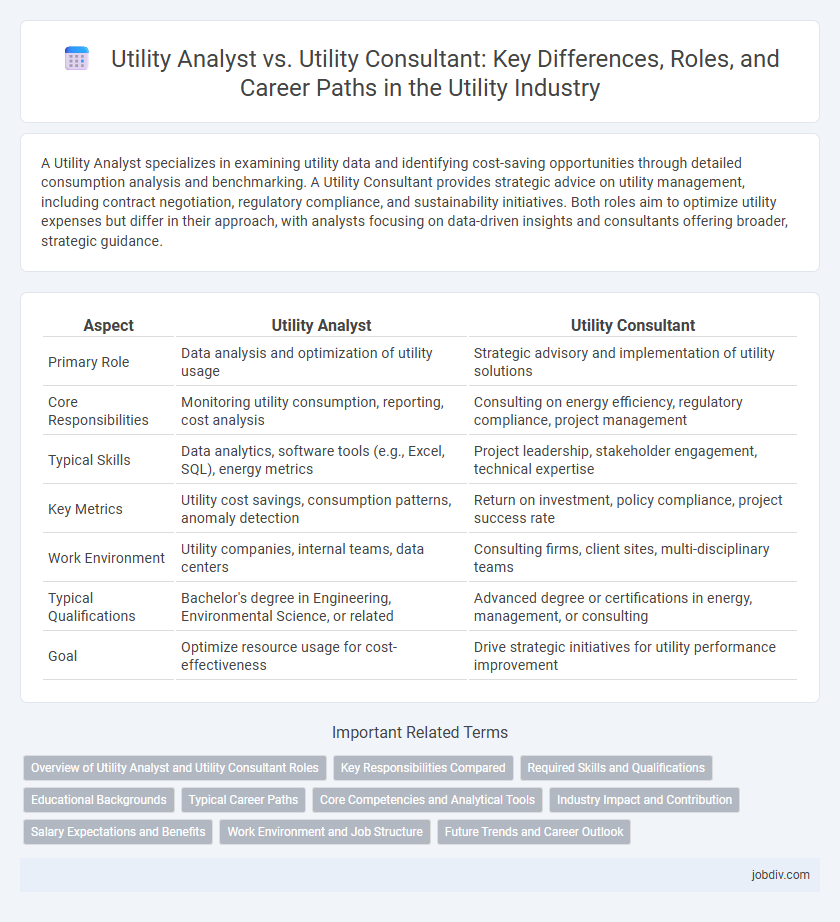A Utility Analyst specializes in examining utility data and identifying cost-saving opportunities through detailed consumption analysis and benchmarking. A Utility Consultant provides strategic advice on utility management, including contract negotiation, regulatory compliance, and sustainability initiatives. Both roles aim to optimize utility expenses but differ in their approach, with analysts focusing on data-driven insights and consultants offering broader, strategic guidance.
Table of Comparison
| Aspect | Utility Analyst | Utility Consultant |
|---|---|---|
| Primary Role | Data analysis and optimization of utility usage | Strategic advisory and implementation of utility solutions |
| Core Responsibilities | Monitoring utility consumption, reporting, cost analysis | Consulting on energy efficiency, regulatory compliance, project management |
| Typical Skills | Data analytics, software tools (e.g., Excel, SQL), energy metrics | Project leadership, stakeholder engagement, technical expertise |
| Key Metrics | Utility cost savings, consumption patterns, anomaly detection | Return on investment, policy compliance, project success rate |
| Work Environment | Utility companies, internal teams, data centers | Consulting firms, client sites, multi-disciplinary teams |
| Typical Qualifications | Bachelor's degree in Engineering, Environmental Science, or related | Advanced degree or certifications in energy, management, or consulting |
| Goal | Optimize resource usage for cost-effectiveness | Drive strategic initiatives for utility performance improvement |
Overview of Utility Analyst and Utility Consultant Roles
Utility Analysts focus on analyzing data related to energy consumption, utility billing, and cost optimization to help organizations reduce expenses and improve efficiency. Utility Consultants provide strategic advice and tailored solutions on regulatory compliance, energy procurement, and sustainability initiatives, leveraging industry expertise to guide client decision-making. Both roles are essential for managing utility costs but differ in scope, with analysts concentrating on data-driven insights and consultants emphasizing strategy and advisory services.
Key Responsibilities Compared
Utility Analysts primarily focus on data analysis, financial modeling, and performance tracking to optimize utility operations and costs, ensuring efficient resource management and regulatory compliance. Utility Consultants provide strategic advisory services, including market analysis, risk assessment, and sustainability planning to help clients enhance utility procurement and infrastructure investments. Both roles require expertise in energy markets and regulatory environments, but analysts emphasize quantitative evaluation while consultants prioritize strategic decision-making.
Required Skills and Qualifications
Utility Analysts require strong analytical skills, proficiency in data modeling, and a deep understanding of utility market regulations and rate structures. Utility Consultants demand expertise in project management, strategic planning, and stakeholder communication, alongside advanced knowledge of regulatory compliance and risk assessment. Both roles typically require a background in engineering, economics, or environmental science, with certifications such as CFA or PMP enhancing qualifications.
Educational Backgrounds
Utility Analysts typically hold degrees in finance, economics, engineering, or statistics, equipping them with strong analytical and quantitative skills necessary for data-driven decision making in utility management. Utility Consultants often possess advanced degrees in business administration, environmental science, or public policy, providing them with a broader understanding of regulatory frameworks, strategic planning, and sustainability issues within the utility sector. Both roles benefit from certifications such as Certified Energy Manager (CEM) or Project Management Professional (PMP) to enhance their expertise and credibility.
Typical Career Paths
Utility Analysts typically begin their careers by gathering and analyzing data related to energy consumption, billing, and market trends, advancing to senior analyst or data management roles within utility companies. Utility Consultants often start in roles focused on strategic planning and project management, progressing to expert advisors or partners in consulting firms that specialize in utility efficiency and regulatory compliance. Both career paths offer opportunities to influence energy policy and drive operational improvements, but Utility Consultants generally engage with a broader range of clients across the industry.
Core Competencies and Analytical Tools
Utility Analysts specialize in data interpretation, cost analysis, and performance metrics using tools like Excel, SQL, and Tableau to optimize utility operations and expenses. Utility Consultants provide strategic advice, regulatory compliance insights, and project management expertise, employing software such as SAP IS-U and Oracle Utilities to guide utility companies in decision-making. Core competencies for analysts emphasize quantitative analysis and reporting, while consultants focus on strategic planning, stakeholder communication, and industry best practices.
Industry Impact and Contribution
Utility Analysts drive operational efficiency by analyzing energy consumption data and identifying cost-saving opportunities within utility companies, directly influencing resource allocation and regulatory compliance. Utility Consultants contribute strategic insights and market expertise, advising utility firms on technology adoption, policy changes, and sustainable practices to optimize long-term performance and industry innovation. Both roles significantly impact the utility sector, with analysts focusing on data-driven decision-making and consultants shaping broader industry trends and strategic growth.
Salary Expectations and Benefits
Utility Analysts typically earn between $60,000 and $85,000 annually, focusing on data analysis and operational efficiency within utility companies. Utility Consultants command higher salaries, often ranging from $90,000 to $130,000, due to their advisory roles on strategic planning, regulatory compliance, and project management for multiple clients. Benefits for both positions often include health insurance, retirement plans, and performance bonuses, but consultants may receive additional perks like travel allowances and flexible work arrangements.
Work Environment and Job Structure
Utility Analysts typically work within utility companies or regulatory agencies, engaging in data analysis, performance monitoring, and operational support in office settings with structured hours. Utility Consultants often operate as external advisors, collaborating with multiple clients across diverse environments while managing flexible schedules and project-based workloads. The job structure for Utility Analysts is more stable and routine, whereas Utility Consultants experience dynamic, variable work patterns reflecting client demands and industry trends.
Future Trends and Career Outlook
Utility Analysts are increasingly leveraging big data analytics and AI to optimize energy distribution, reflecting a strong demand for technical proficiency in smart grid technologies. Utility Consultants are expected to expand their roles in sustainability advisory and regulatory compliance, driven by the global push for renewable energy and carbon reduction targets. Both career paths offer robust growth, with Utility Analysts focusing on operational efficiency and Utility Consultants emphasizing strategic transformation in an evolving energy landscape.
Utility Analyst vs Utility Consultant Infographic

 jobdiv.com
jobdiv.com